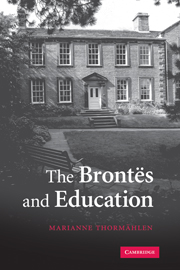Book contents
- Frontmatter
- Contents
- Acknowledgements
- Abbreviations and editions
- Introduction
- I EDUCATION AND SOCIETY
- II HOME AND SCHOOL
- III SUBJECTS AND SKILLS
- 7 A sound English education
- 8 Religion and education
- 9 The accomplishments
- 10 Male and female education
- 11 Beyond the schoolroom: reading and the Brontës
- IV STRATEGIES AND METHODS
- V ORIGINALITY AND FREEDOM
- Notes
- Select bibliography
- Index
8 - Religion and education
Published online by Cambridge University Press: 22 September 2009
- Frontmatter
- Contents
- Acknowledgements
- Abbreviations and editions
- Introduction
- I EDUCATION AND SOCIETY
- II HOME AND SCHOOL
- III SUBJECTS AND SKILLS
- 7 A sound English education
- 8 Religion and education
- 9 The accomplishments
- 10 Male and female education
- 11 Beyond the schoolroom: reading and the Brontës
- IV STRATEGIES AND METHODS
- V ORIGINALITY AND FREEDOM
- Notes
- Select bibliography
- Index
Summary
A present-day reader might find the sound-English-education curriculum presented above curiously wanting in religious instruction and wonder about the early-nineteenth-century equivalent of the ‘RE’ subject. The answer is that religion was supposed to be everywhere. Not only did Scripture reading, prayers, hymn singing and Biblical history account for a substantial share of the daily curricular activities; religion was to provide the impetus and the foundations of any endeavour to educate the people, and the Bible was to permeate instruction on every subject. For instance, arithmetic might be practised by subtracting the number of chapters in one book of the Bible from that of another. Natural history should not only constantly remind pupils of the wonders of the Creation; wherever possible, discussions of species of plants and animals would proceed from Biblical loci.
As Britain had not had a Frederick II nor experienced Revolutionary/Napoleonic rule, secularism did not manage to assert itself in popular education until most of the nineteenth century had passed. As Chapter 1 indicated, the history of elementary education in Britain up to the implementation of the Education Act in 1870 is to a large extent made up of a bewildering series of conflicts between different religious and political-ideological factions. It is impossible to point to heroes and villains in those decades of angry confusion. In 1839, for instance, a man whom one might expect to find on the side of the angels, Frederick Denison Maurice, was a passionate opponent of state authority over education.
- Type
- Chapter
- Information
- The Brontës and Education , pp. 97 - 101Publisher: Cambridge University PressPrint publication year: 2007



